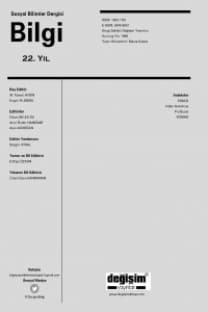Zorunluluğun Mekân Tutması: Rousseau Örneği
Rousseau Aydınlanma düşünürü olduğu kadar romantik bir düşünürdür. Romantizmi köklere dönme, modern dünyaya yönelik eleştiri, hüzün, geçmişte mekân tutma, zorunluluk fikri, gerçeğin kurmaca ile iç içe geçmesi gibi başlıklarla sıralarsak Rousseau metinleri fazlaca romantiktir. Bu metinlerde modern olana karşı modern bir eleştiri ile karşılaşırız. Rousseau’nun içinde yaşadığı topluma dair muhalif tutumu beraberinde bir başlangıç, böyle olmayan bir zaman, bir mekân arama serüveni ile sonuçlanır. Rousseau köklere döner. Düşü- nür için başka türlü olamayan zorunlu gerçeklik kendini zıt çiftler halinde ortaya koyar. Doğal durum-doğal olmayan durum, kır yaşamı-kent yaşamı çiftlerinde ilk olan daima ideal olandır. Bu makalede de bu zıtlığın ardındaki zorunluluk fikri ve bunların dayandığı mekân-mülkiyet ilişkisi incelenmiştir.
Anahtar Kelimeler:
Rousseau, Zorunluluk, Mekân, Romantik, Kent
Rousseau, the enlightenment thinker is a romantic as well. If one defines romanticism as a return to the roots, a criticism of the modern world, sorrow, holding a space in the past, the idea of necessity, and truth intertwined with the fiction, one would refer to his texts as romantic. In such texts, one faces with a modern critique directed to the modern. Rousseau's oppositional position to the society which he lived in, results in an adventure of searching for an origin, a space and time that is not much similar to now. Rousseau returns to roots. Reality which cannot be otherwise reveals itself as polar dualisms: In the dualisms of natural state- non-natural state, and rural life-urban life, the antecedent is the ideal one. In this paper, the idea of necessity behind these antagonisms and their space-property relationship were examined.
- ISSN: 1302-1761
- Yayın Aralığı: Yılda 2 Sayı
- Başlangıç: 1999
- Yayıncı: Değişim Yayınları
Sayıdaki Diğer Makaleler
Şiir’den İdeal Tip’e: Romantik Bilim
Ortadoğu’da Değişen Dengeler ve Türkiye’nin Konumu
Zorunluluğun Mekân Tutması: Rousseau Örneği
Is the Twin Deficits Hypothesis Valid in the case of Turkey?
Fuat Sekmen, Ünsal Ozan Kahraman
Milliyetçiliğin Romantik Dönemi Üzerine Saptamalar
Hakan Poyraz, Fatma Berna Yıldırım
